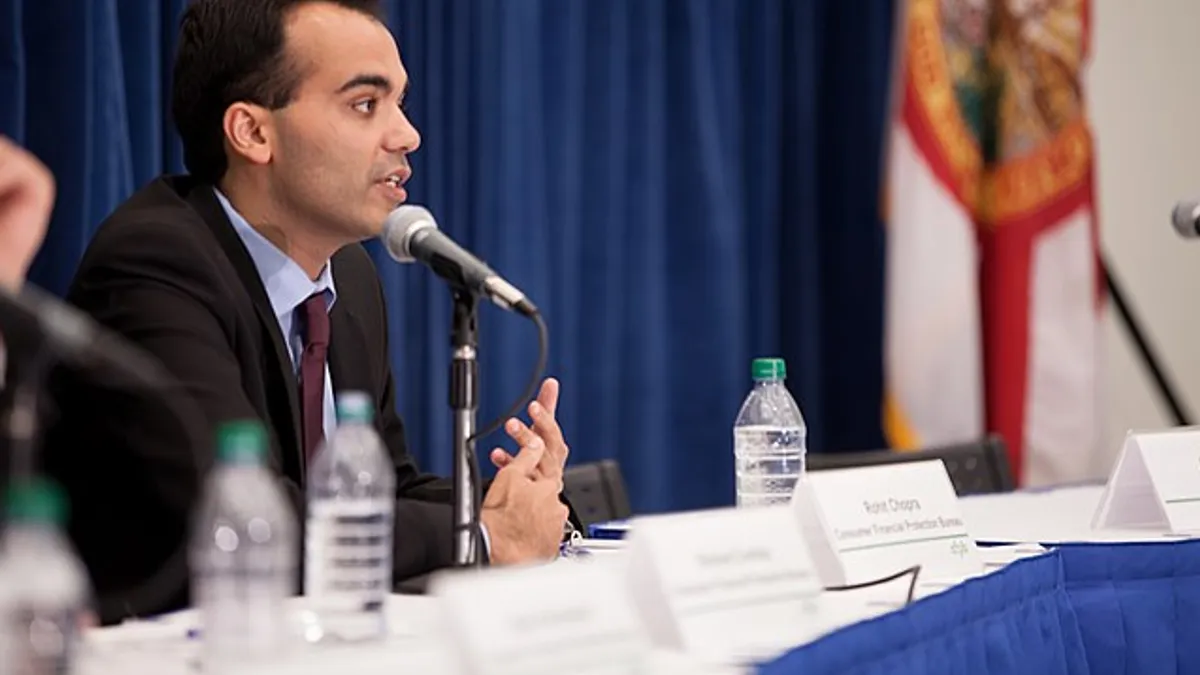Dive Brief:
- The U.S. Chamber of Commerce, American Bankers Association, Consumer Bankers Association and Independent Community Bankers Association published a white paper Tuesday rebuking the Consumer Financial Protection Bureau’s recently expanded authority to curb discrimination in consumer finance.
- The CFPB, under the leadership of Director Rohit Chopra, enacted a policy in March that broadened the definition of unfair, deceptive or abusive acts or practices (UDAAP) to allow the watchdog to clamp down on discrimination in the financial sector.
- The Chamber of Commerce and trade groups allege the CFPB has conflated the legal definition of “unfairness” to include “discrimination,” although Congress intended no overlap in the concepts.
Dive Insight:
The CFPB is traditionally relegated to combating lending discrimination in line with the 1974 Equal Credit Opportunity Act (ECOA). But under Chopra’s leadership, the agency has sought to expand its authority to combat discrimination outside of the purview of fair lending laws.
“When a person is denied access to a bank account because of their religion or race, this is unambiguously unfair,” Chopra said in March. “We will be expanding our anti-discrimination efforts to combat discriminatory practices across the board in consumer finance.”
Now, the Chamber of Commerce, along with three banking trade groups, are clapping back against the buildup of CFPB authority.
“[B]anks support fair, objective, and transparent enforcement of civil rights and fair lending laws,” the organizations said. “However, we cannot support the CFPB's recent actions, taken without legislative authority, to extend fair lending laws beyond the bounds carefully set by Congress.”
The white paper comes as the Chamber of Commerce also launched a six-figure digital ad campaign Tuesday spotlighting “Chopra’s outsized view of his role and radical agenda, subject to no accountability,” according to a press release.
The crux of the white paper’s argument is that Congress never intended the terms “unfairness” and “discrimination” to be used interchangeably, according to the chamber and trade groups, and the CFPB’s new view that “unfairness” can be applied to discriminatory practices reflects an overstep of authority.
The white paper also argues the CFPB failed to adhere to the Administrative Procedure Act requirements for notice-and-comment rulemaking. The groups called on the CFPB to rescind an examination manual it updated in March.
The amended text explains how discrimination by financial institutions can trigger the CFPB’s obligation to prevent unfair practices. In particular, the exam manual states discrimination constitutes “unfairness” when it causes unavoidable harm to consumers, regardless of whether the action was intentional or covered by the ECOA.
The CFPB’s recent actions are subject to congressional disapproval, as defined by the Congressional Review Act, the chamber and trade groups said.














